The Athens Marathon is the biggest sporting event in Greece attracting more than 8,000 runners in each category.
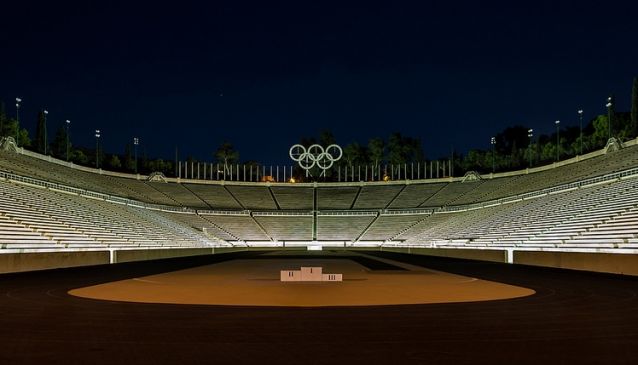
Today, marathon running is an increasingly popular sport with all age groups and many runners now regularly travel to events all over their country and abroad to compete. There are more than 100 major marathons each year with those in London, Berlin, Boston, New York and Athens being the most popular. Marathon running is considered to be the ultimate personal experience as it tests the strength of each runner's mind, body and soul to the limit.
On Sunday 10 November it is the 31st Athens Classic Marathon with Marathon, 5 and 10 km road races, power walking and children's event which will all take place along the historic streets of the Greek capital. The Athens Marathon is the biggest sporting event in Greece attracting more than 8,000 runners in each category. The Marathon is also a major international event, attracting runners come from as far afield as East Africa, Japan, New Zealand and Antarctica to compete because this event is like no other as it is steeped in history as the very first marathon was run in Athens 2,500 years ago...
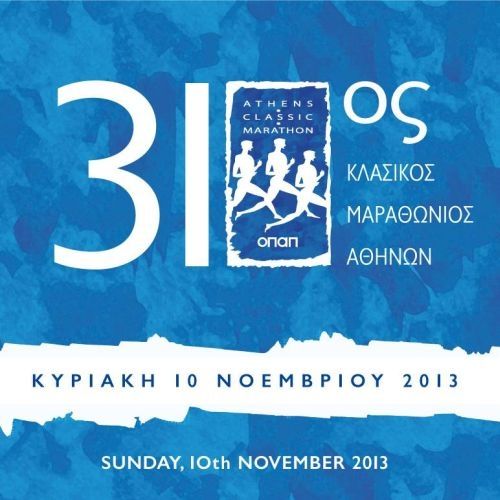
31st Classic Marathon of Athens
Legend tells how the first marathon was run by the Greek soldier Pheidippides when he ran from the Battle of Marathon all the way to Athens to deliver the news that the Persians had been beaten by the Greeks and democracy had been born and that the Greek way of life preserved - a way of life that would be the foundation of western civilisation. Pheidippides arrived at the Senate and proclaimed nenikekamen – we are victorious – before collapsing and dying on the steps of the Senate.
The marathon was established as a competitive race as one of the sports in the first Olympic Games in 1896, but the standard distance of 42.195 km (26 miles and 285 yards) did not become official until the 1921 Olympics. Traditionally the men’s marathon is the final event of the Olympics with the finishing line placed in the Olympic stadium and the arrival of the first runners incorporated in the closing ceremony.
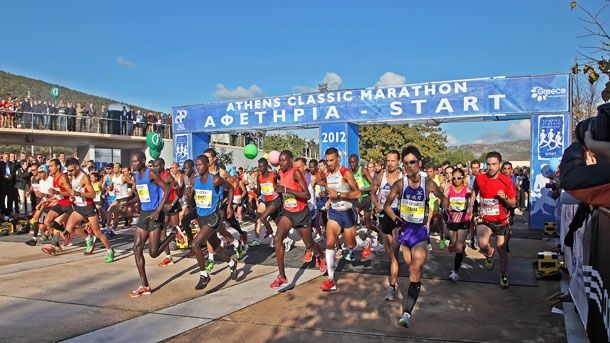
Athens Classic Marathon
The Athens Classical Marathon began in 1972, organised by the Greek Tourist Board and Athletics Association. Today, it is one of the world's most difficult marathons as it is uphill for two thirds of its course. The Course begins in the town of Marathon and for the first four kilometres is downhill, passing the tomb of Athenian soldiers before levelling out for the next few kilometres as it heads for the coast at Neamakri. The course then climbs the hills surrounding Athens and certainly gets tougher for the second part passing through the District of Pikermi and the City of Pallini before dropping down towards the city, passing the Presidential Palace and National Gardens towards the finishing line in the Panathinaikon Stadium 'Kalimarmaro Stadium', which has been an athletic site since ancient times. The stadium was also the finishing line for the Olympic marathons in both the 1896 and 2004 Olympics.
As safety for the runners is of paramount importence,1800 volunteers are located at regular stages along the routes to ensure that runners are kept rehydrated throughout and any health issues are dealt with promptly.
The current record for the marathon is 2 hours 11 minutes and 35 seconds for men which was established by Raymond Bett in 2012 and 2 hours 31 minutes and 06 seconds for women set by Rasa Drazauskaite in 2010. Both the10 and five kilometre races are run simultaneously and for this year's event there are some changes with the start pointing point moved to Amalis Avenue and changes to the course too although the finish will still be in Panathinaikon Stadium.
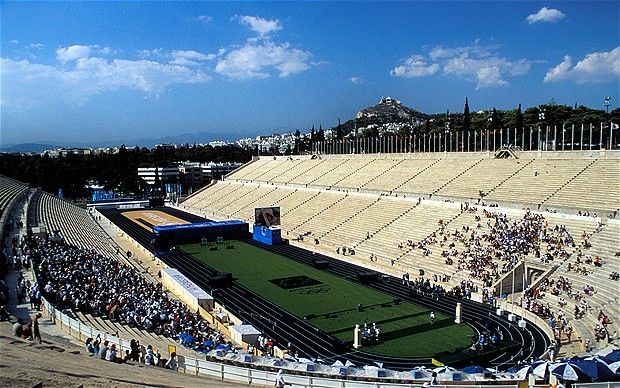
Kalimarmaro Stadium
Whilst the Marathon is the focus of many people's visit to Athens, most combine it with a holiday in the city 'that has been nicknamed 'the cradle of Western Civilisation'. It is fun to explore this vibrant city, discovering the colourful tapestry of its 2,500 year history. Athens was named after Athena, the Greek goddess and is an archaeological treasure trove with its instantly recognisable Acropolis being one of the most photographed monuments in the world. As well as being the capital city of Greece it is its economic, industrial, political and cultural centre and underwent many changes when it hosted the 2004 Olympics, including the development of a new international airport and metro. Its 2.5 mile long Archaeological Promenade was opened that year too, making it very easy for visitors to enjoy the archaeological sites as it links them so that they are now easily accessible on foot. The promenade begins at the Temple of Zeus (6th Century BC) and leads to Hadrian's Arch (AD 131) the symbolic entrance to the city. Other monuments along the way include the ancient theatre of Dionysus (the god of wine), the ruins of Askelpieion (5th century BC) before the climb up to the 'jewel in the crown' the world renowned Parthenon and museum which offer magnificent views over the city below.
Another renowned monument is found in Syntama Square - the monument to the unknown soldier stands close to the parliament building, where it is guarded by the Evzonas in the traditionally white uniforms. It is fun to discover the tiny winding streets of the Plaka area and to admire the different architectural styles and to visit the Ancient Agora - market place and some of the beautiful Byzantine churches. There are fragments of the Ottoman period too including the Fatihie and Tzistaki mosques and some Turkish baths. For those with plenty of energy, climbing Lycabettus Hill is well worth the effort to enjoy the stunning panoramic views from its summit.
Athens is great for those who enjoy shopping with its plethora of European style shops, various markets and the traditional bazaar at Monastraki. In Ermou are the most famous shopping streets and an incredible 2,500 shops! There are sophisticated coffee bars, ouzeris and restaurants offering traditional and contemporary Greek cuisine as well as international menus.
Athens is a wonderful blend of ancient and modern, traditional and contemporary and is certainly a city that never sleeps and few visitors manage to fit all they plan to do in their holiday which is why many return time and time again.
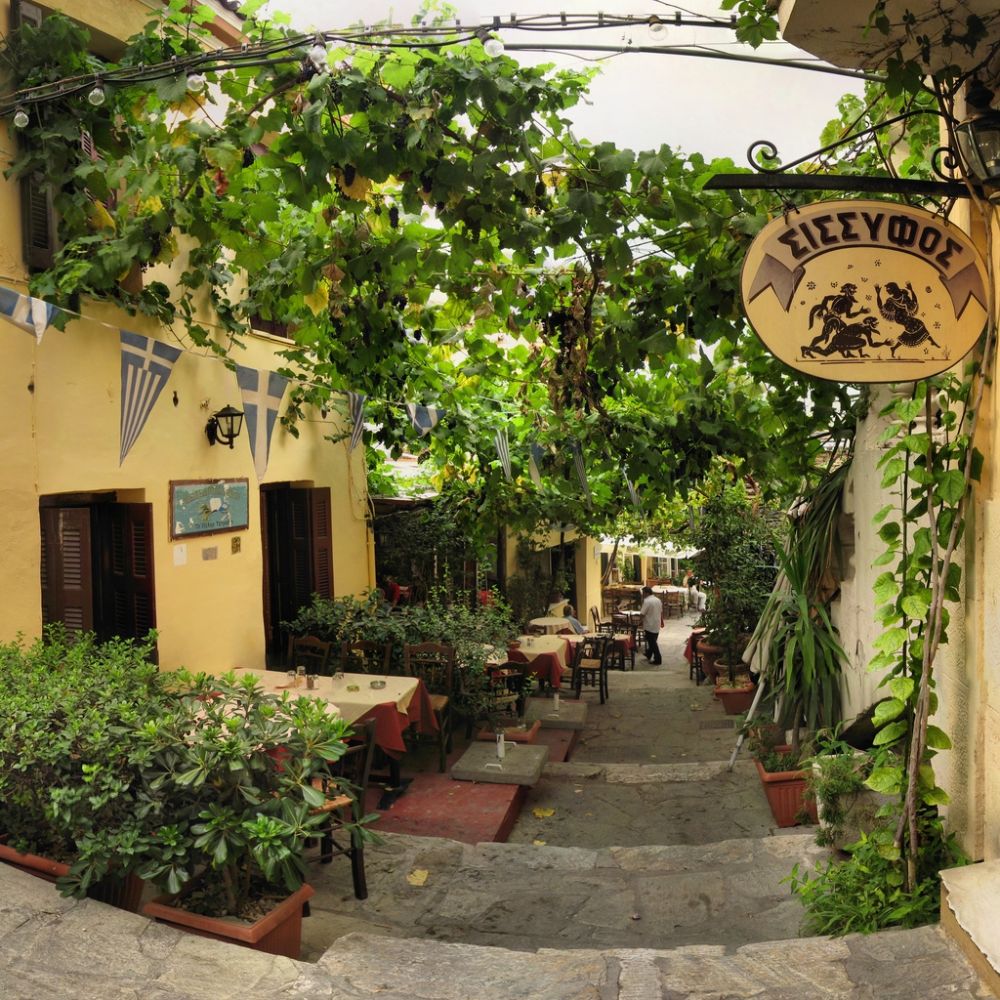
Plaka